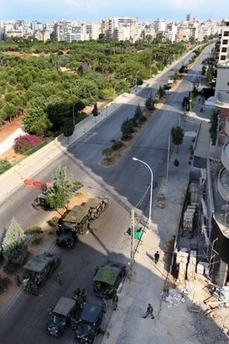 Machine gun-fire and explosions could be heard coming from West Beirut, where masked gunmen were seen standing on street corners, occasionally opening fire with automatic rifles and rocket-propelled grenades. No clashes were reported in predominantly Christian East Beirut. At least five people have been killed in fierce fighting between supporters of Lebanon’s government and the opposition in Beirut, officials say. Television showed gunmen firing rifles and rocket-propelled grenades in central and southern areas of the city.
Machine gun-fire and explosions could be heard coming from West Beirut, where masked gunmen were seen standing on street corners, occasionally opening fire with automatic rifles and rocket-propelled grenades. No clashes were reported in predominantly Christian East Beirut. At least five people have been killed in fierce fighting between supporters of Lebanon’s government and the opposition in Beirut, officials say. Television showed gunmen firing rifles and rocket-propelled grenades in central and southern areas of the city.
After the news conference, Hezbollah‘s leader Sheikh Nasrallah, says a Lebanese government decision to declare the telecommunications network illegal amounts to a declaration of war. Those Cabinet decisions sparked two days of sectarian clashes between Hezbollah and government supporters. "The decision is tantamount to a declaration of war … on the resistance and its weapons in the interest of America and Israel," Hassan Nasrallah said in a news conference aired live on television Thursday. "We are now embarking on a totally new era," he told a news conference in Beirut. He offered a way out of the latest crisis, saying the "illegitimate" government must revoke its decisions against Hezbollah. Hezbollah runs its own secure network of primitive private land lines. Nasrallah confirmed the network was essential for the fight Israel’s high-tech army in the 2006 summer war. He said the telecommunications network was "the most important part of the weapons of the resistance" and added Hezbollah had a duty to defend those weapons. He and other Hezbollah leaders have suggested they are regularly targeted by Israel and they need secure communications, and also added this communication line helped a cease-fire in July 2006 War. "I am not declaring war. I am declaring a decision of self-defense," he said. The government has "crossed all the red lines. We will not be lenient with anyone." "Those who try to arrest us, we will arrest them," he said. "Those who shoot at us, we will shoot at them. The hand raised against us, we will cut it off." He said Maj. Gen. Wafiq Shukeir, the airport security chief that the government decided to remove, will stay in his post, rejecting any replacement. Sheikh Nasrallah criticised the suspension of the head of security at Beirut airport, Brig Gen Wafiq Shuqeir, because of his alleged closeness to Hezbollah. The government also accused him of failing to deal with a secret camera allegedly set up by Hezbollah to monitor the movement of aircraft and VIPs. But Sheikh Nasrallah insisted Gen Shuqeir was not a member of any opposition group, merely a neutral member of the armed forces. The Hezbollah leader’s remarks came after the people of Beirut awoke for the second day running to find their city largely brought to a halt by roadblocks of burning tyres and bulldozed earthworks.
Lebanese governing coalition leader Saad al-Hariri appearing to row back on government decisions which the group had viewed as a declaration of war. After the speech Of Hezbollah Leader, Hariri stated that he would consider the government decisions a "misunderstanding". He was referring to a cabinet decision this week to declare illegal Hezbollah’s communications network and remove the head of airport security, who is close to the group, from his post. Hezbollah says the communications network is part of its military infrastructure but before any steps taken would like a direct election of the vacant seat of Presidency and then they could resume dialogue. Hariri added "This is a crime that must stop immediately. We will not accept for Beirut to kneel before anyone. Beirut will not kneel," he added. Hariri said Hezbollah had "misinterpreted" the government’s decision earlier this week to probe a private communications network set up by the group and to reassign the airport security chief over allegations he was close to Hezbollah. He said the measures were aimed at protecting the army and did not target Hezbollah. Hariri said the two decisions should be put in the hands of the army, which both sides see as a neutral institution. Hariri also urged the opposition, backed by Syria and Iran, to agree to the immediate election of consenus candidate and army chief Michel Sleiman as president and to engage in an national dialogue under the auspices of the new president. "The Sunni-Shiite dissension has already been ignited and we must put out the fire," Hariri said.
General Aoun, suggested for an immediate debate and understanding between all parties and hoped for a cease-fire and described the violence and riots as politically motivated and not a Sunnite Shiite clash, "This is not a sectarian dispute, it is political," Aoun said. Aoun praised the role of the army, and said "The army has been playing a proper role and should intervene in the event the fight is one sided." Aoun defended Hezbollah and placed the blame on the government triggering these events, urging them to surrender to Hezbollah’s demands by revoking prior decisions. Aoun added that blocking the road to Beirut’s Rafik Hariri International Airport was the result of Lebanon’s deepening economic crisis and called on the government to revoke its latest decisions.
On the other hand Progressive socialist Party (PSP) leader MP Walid Jumblatt called Hezbollah leader’s comments "silly". He said Hezbollah made a big deal over the government decision. He added, "I didn’t know General Shuqair is so important to disrupt the lives of the Lebanese and destroy the country."Jumblatt added: "Lebanon is much more important than my party or Hezbollah."
Hizbullah’s paramilitary infrastructure across Lebanon contributes to the erosion of the state’s monopoly on the use of force and represents a "threat to regional peace," a U.N. envoy warned Thursday. U.N. Middle East envoy Terje Roed Larsen told the Security Council that Hizbullah "maintains a massive paramilitary infrastructure separate from the state." He added that this had "an adverse effect" on the Lebanese government’s monopoly on the use of force and "constitutes a threat to regional peace and security." Briefing the 15-member council on Hizbullah’s anti-government protests over the past two days, Roed Larsen said "these developments give rise to growing fears among the Lebanese that Hizbullah is building parallel institutional structures distinct from, and in competition with, those of the state." "It is believed that this contributes to the erosion of the state’s institutions of its monopoly on the use of force," he added. Roed Larsen said the government had informed the United Nations that Hizbullah had its own, separate, secure communication network which "connects to a Syrian network beyond the border." Hizbullah argues it needs its arsenal to deter Israeli attacks. The White House on Thursday demanded that Hizbullah "stop their disruptive activities" as fierce gunbattles raged in Beirut. "Hizbullah needs to make a choice: Be a terrorist organization or be a political party, but quit trying to be both. They need to stop their disruptive activities now," said U.S. national security council spokesman Gordon Johndroe. U.S. President George Bush looks forward to discussing Lebanon’s political crisis when he meets with Lebanese Prime Minister Fouad Saniora next week at Egypt’s Red Sea resort of Sharm el Sheikh, said Johndroe.
A careful analysis of what Nasrallah and Hariri both said suggests that they are speaking the same language that has always defined Lebanese politics and politicians: Act tough, show that you are a real man who is prepared to fight, and then offer a deal in which nobody loses face, manhood, or their privileged access to shared incumbency and the assets of statehood. Hariri’s specific offer in reply to Nasrallah’s suggestions seems reasonable, and in line with what Nasrallah said he had told the Iranian ambassador: that we can find a solution to this problem. The points each man made – basically to review the government’s two controversial decisions and immediately restart the national dialogue – indicate a middle ground where the concerns of all parties can be taken into account. The fact that all agree on General Michael Suleiman as the next president is also a good sign. The question is not whether these and other political leaders in Lebanon will ultimately agree on a comprehensive compromise that they can live with. That is as certain as the breeze. The unknown factor is only about how much more suffering, death and political mediocrity all Lebanon must suffer before the politicians actually make the compromises. Their commitment to the discipline of a purposeful and practical national dialogue remains unclear. Both major camps engaged in a fruitless dialogue two years ago, and there are few signs that they would do any better now.
Clashes between government supporters and the opposition escalated in Lebanon on Thursday, with gunfights in several parts of the country, roads blocked and the international airport virtually shut down. At least eight people were reported wounded in the east and the north as a general strike took on a sectarian tone, pitting mainly Sunni Muslim supporters of the government against Shiite followers of the opposition. All eyes were on Hezbollah chief Hassan Nasrallah, who hold a rare news conference via video link later in the afternoon in response to government moves against his militant group.The army and riot police spread out in Beirut while many schools and businesses in the capital remained shut for the second straight day. The army command warned that "if this situation continues, everyone will lose and this will affect the unity of the military." Armed men, some hooded or masked, were seen in several mixed Sunni and Shiite neighbourhoods. In a tersely worded statement, the army command warned that "if this situation continues, everyone will lose and this will affect the unity of the military." And newspapers drew parallels with the lead-up to the devastating 1975-1990 civil war. Troops and riot police spread out in Beirut, with many schools and businesses remaining shut for a second straight day. Armed men, some hooded or masked, were seen in several mixed Sunni and Shiite neighbourhoods.
Protesters burned tyres and lit fires inside large metal rubbish bins along the airport road, which remained blocked by large mounds of earth dumped by Hezbollah supporters on Wednesday when a strike over wages degenerated into sectarian violence. An airport official told AFP that all incoming and outgoing flights had been cancelled until at least 4:00 pm (1300 GMT), but it was unclear whether normal traffic would resume after that. One flight to London did leave Beirut early on Thursday. Government loyalists burned tyres and set up road blocks along various point of the main highway in the east of the country leading to Syria, forcing travellers to find alternate routes, an AFP correspondent witnessed. Five people were wounded, four of them women, a security official in the eastern town of Chtaura told AFP.
Three people were also wounded in the northern city of Tripoli in a shootout between rival factions. The highway between the capital and the southern coastal city of Sidon was also closed by government supporters who burned tyres and dumped piles of earth on the road. The road blocks by the government loyalists appeared to be in response to the shutdown of the airport by the opposition. An official with the opposition movement Amal warned that the situation could get out of hand, and accused the majority of pushing the country toward a civil war. "It is clear the majority is seeking an escalation and wants to push the country toward a civil war," the official, who did not want to be named, told AFP. "What we are trying to do is calm down the situation."
The Lebanese army command issued a call for calm, saying that if the violence continued it would affect the unity of the military. Saudi Arabia warned the opposition against an escalation of the situation. "The kingdom urges the groups behind the escalation to reconsider their position, and to realise that leading Lebanon towards turmoil will not bring victory to any party except extremist external forces," the state news agency SPA quoted an official as saying. The opposition has vowed to keep up the protests until the government cancels decisions taken earlier in the week. On Tuesday the government said it was launching a probe into a private telephone network set up by Hezbollah, and accused the group of placing surveillance cameras around the airport to monitor the comings and goings of pro-government politicians. The cabinet also reassigned the head of airport security over allegations that he was close to Hezbollah. The clashes erupted on Wednesday during what was supposed to be a general strike called by the main labour union over price increases and wage demands.
Please Click Read more for more pictures
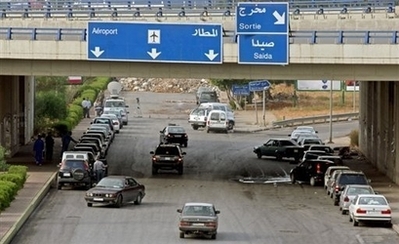 Loyal to Lebanon’s opposition on Thursday began removing roadblocks on the highway leading to Beirut‘s international airport, paving the way for commercial flights to resume, an AFP correspondent said. A MEA plane was set to arrive in the early evening, the first commercial flight since incoming and outgoing services were suspended a week ago. "An MEA flight from Paris is scheduled to arrive from Paris at 7:00 pm (1600 GMT) and will depart to Larnaca, Cyprus at 8:30 pm," an airport official said. Crowds of people gathered on a bridge overhead to watch as tractors piled sand and rock into trucks as they dismantled the roadblocks."The airport is the pulse and life of the country," said Samih Karneb, 45. "At least now there won’t be any more shows of force. Each side knows their size." Abbas, 26, said that opening the airport motorway was "a beautiful sight," while a soldier standing nearby disagreed, telling AFP that "it shouldn’t have come to this in the first place. "Are we supposed to be happy about this?" he asked.
Loyal to Lebanon’s opposition on Thursday began removing roadblocks on the highway leading to Beirut‘s international airport, paving the way for commercial flights to resume, an AFP correspondent said. A MEA plane was set to arrive in the early evening, the first commercial flight since incoming and outgoing services were suspended a week ago. "An MEA flight from Paris is scheduled to arrive from Paris at 7:00 pm (1600 GMT) and will depart to Larnaca, Cyprus at 8:30 pm," an airport official said. Crowds of people gathered on a bridge overhead to watch as tractors piled sand and rock into trucks as they dismantled the roadblocks."The airport is the pulse and life of the country," said Samih Karneb, 45. "At least now there won’t be any more shows of force. Each side knows their size." Abbas, 26, said that opening the airport motorway was "a beautiful sight," while a soldier standing nearby disagreed, telling AFP that "it shouldn’t have come to this in the first place. "Are we supposed to be happy about this?" he asked.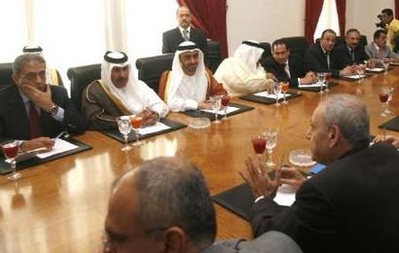 The security outlook in Lebanon continued to improve on Wednesday, amid a tumultuous political situation and a whirlwind of mediation efforts. Southeast of Beirut, the Lebanese Aarmed Forces (LAF) detonated unexploded hand grenades in Choueifat as part of a deployment to the Aley and Chouf districts, which were the scene of intense clashes over the weekend between Progressive Socialist Party and opposition fighters. The Zahle district in the central Bekaa region also saw a relative return to normalcy, with the reopening of several roads shut off last week by government supporters. Despite clashes and reports of brutality in Tripoli during the past few days, a security source told The Daily Star that the security outlook in and around the Northern port city has improved markedly, with LAF deployments resulting in a citywide clamp-down on violence. An overnight explosion was reported, but it appears that this was due to an overloaded electricity generator. In a measure aimed at easing the burden of citizens affected by the violence, the Internal Security Forces released a statement Tuesday announcing that "all ISF bureaus and stations" will be open for the airing of complaints and assuring citizens that "appropriate and necessary measures will be taken to mitigate any existing difficulties." In other security-related news, the LAF’s commander, General Michel Suleiman, met with US Charge d’Affaires to Lebanon Michele Sison and a US Central Command (CENTCOM) delegation headed by acting CENTCOM commander Lieutenant General Martin E. Dempsey in order to discuss a possible shoring up of the Lebanese military’s capabilities.
The security outlook in Lebanon continued to improve on Wednesday, amid a tumultuous political situation and a whirlwind of mediation efforts. Southeast of Beirut, the Lebanese Aarmed Forces (LAF) detonated unexploded hand grenades in Choueifat as part of a deployment to the Aley and Chouf districts, which were the scene of intense clashes over the weekend between Progressive Socialist Party and opposition fighters. The Zahle district in the central Bekaa region also saw a relative return to normalcy, with the reopening of several roads shut off last week by government supporters. Despite clashes and reports of brutality in Tripoli during the past few days, a security source told The Daily Star that the security outlook in and around the Northern port city has improved markedly, with LAF deployments resulting in a citywide clamp-down on violence. An overnight explosion was reported, but it appears that this was due to an overloaded electricity generator. In a measure aimed at easing the burden of citizens affected by the violence, the Internal Security Forces released a statement Tuesday announcing that "all ISF bureaus and stations" will be open for the airing of complaints and assuring citizens that "appropriate and necessary measures will be taken to mitigate any existing difficulties." In other security-related news, the LAF’s commander, General Michel Suleiman, met with US Charge d’Affaires to Lebanon Michele Sison and a US Central Command (CENTCOM) delegation headed by acting CENTCOM commander Lieutenant General Martin E. Dempsey in order to discuss a possible shoring up of the Lebanese military’s capabilities. 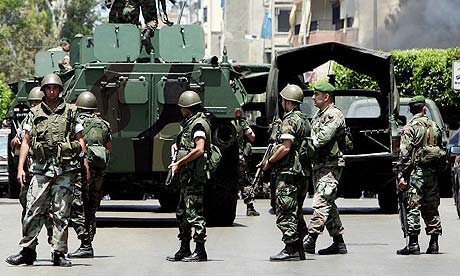 BEIRUT, Lebanon – The Lebanese army expanded its troop deployment to several tense areas around the country Tuesday, saying its soldiers would use force if needed to impose order. The army has played a central role in defusing the violence that started last Wednesday by calling on armed supporters from both sides to leave the streets. But it has remained neutral in the conflict and did not intervene. The army’s announcement signaled that it could step up its involvement to bring an end to the country’s worst internal fighting since the end of the civil war. Army units will prevent any violations, whether by individuals or groups, in accordance with the law even if this is going to lead to the use of force," said an army statement released late Monday. One reason the army had largely stayed out of the fighting was the fear that its forces could break apart along sectarian lines as they did during the civil war. The army statement said troops would prevent armed civilians from roaming the streets and called on all groups in the country to cooperate. Streets in the capital were busy as more businesses opened, but schools and universities remained closed. Also, many roads were still blocked including the highway leading to the country’s only international airport. The tense areas where troops deployed early Tuesday included the northern city of
BEIRUT, Lebanon – The Lebanese army expanded its troop deployment to several tense areas around the country Tuesday, saying its soldiers would use force if needed to impose order. The army has played a central role in defusing the violence that started last Wednesday by calling on armed supporters from both sides to leave the streets. But it has remained neutral in the conflict and did not intervene. The army’s announcement signaled that it could step up its involvement to bring an end to the country’s worst internal fighting since the end of the civil war. Army units will prevent any violations, whether by individuals or groups, in accordance with the law even if this is going to lead to the use of force," said an army statement released late Monday. One reason the army had largely stayed out of the fighting was the fear that its forces could break apart along sectarian lines as they did during the civil war. The army statement said troops would prevent armed civilians from roaming the streets and called on all groups in the country to cooperate. Streets in the capital were busy as more businesses opened, but schools and universities remained closed. Also, many roads were still blocked including the highway leading to the country’s only international airport. The tense areas where troops deployed early Tuesday included the northern city of 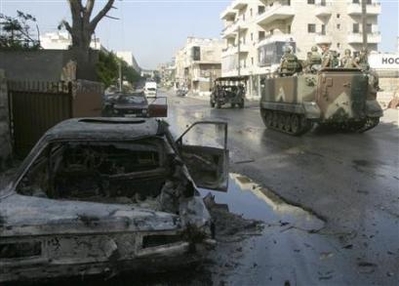 – Lebanon was on a knife-edge on Monday . Pro-government gunmen and supporters loyal to Lebanon’s
– Lebanon was on a knife-edge on Monday . Pro-government gunmen and supporters loyal to Lebanon’s 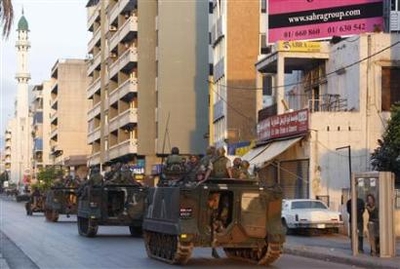 The army deployed across much of
The army deployed across much of 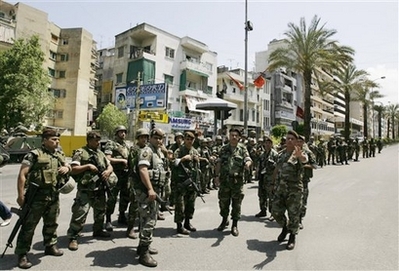 Hezbollah and its allies will end all armed presence in Beirut after the Lebanese army overturned government measures against the group, an opposition statement said on Saturday. "The Lebanese opposition will end all armed presence in Beirut so that the capital will be in the hands of the army," the statement said. – Earlier The Lebanese army overturned on Saturday two government measures against Hezbollah that had triggered the group to take control of Beirut, and the military urged gunmen to withdraw from the streets. The army said in a statement it was keeping the head of the security at Beirut airport in his post and that it would handle Hezbollah’s communications network in a way "that would not harm public interest and the security of the resistance". Lebanon’s Prime Minister Fouad Siniora said earlier on Saturday that he was putting the two issues to the army for them to decide. They have also requested from the government to cancel these 2 decisions taken.
Hezbollah and its allies will end all armed presence in Beirut after the Lebanese army overturned government measures against the group, an opposition statement said on Saturday. "The Lebanese opposition will end all armed presence in Beirut so that the capital will be in the hands of the army," the statement said. – Earlier The Lebanese army overturned on Saturday two government measures against Hezbollah that had triggered the group to take control of Beirut, and the military urged gunmen to withdraw from the streets. The army said in a statement it was keeping the head of the security at Beirut airport in his post and that it would handle Hezbollah’s communications network in a way "that would not harm public interest and the security of the resistance". Lebanon’s Prime Minister Fouad Siniora said earlier on Saturday that he was putting the two issues to the army for them to decide. They have also requested from the government to cancel these 2 decisions taken. 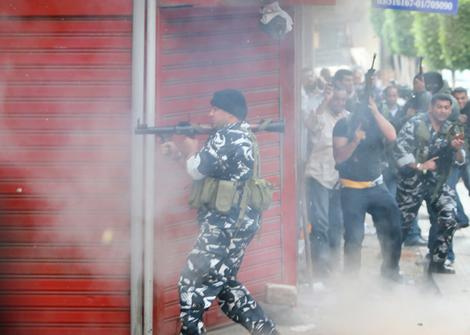 HEZBOLLAH took control of large areas of Beirut last night, tightening their grip on the city in a major confrontation with the Government. Security sources said at least At least 18 people have been killed and 38 wounded in three days of battles between pro-government gunmen and fighters loyal to Hezbollah in the worst internal strife since the 1975-90 civil war. Hezbollah and its allies controlled all of mainly Muslim west Beirut, except in one district, Tarek al-Jadidi, where pro-Government gunmen laid down their arms late yesterday and allowed the army to move in. Witnesses in the neighbourhoods of Zarif, Corniche Mazraa and Ras al-Nabi said of Hezbollah and its ally Amal were out in force. Fierce gun battles were raging in the mixed Sunni-Shiite-Christian neighbourhood of Hamra, where Hezbollah appeared to be gaining ground. Beirut’s port was shutting down because of the conflict, port official Elie Zakhour said.Gunmen loyal to the Islamist movement, and Iran, forced the pro-Government Future News television off the air, said a senior official at the Beirut station. Future News is owned by Saad al-Hariri, a Sunni politician who leads the governing coalition known as the March 14 Alliance, which enjoys backing from the US, France and Saudi Arabia. Gunmen had also taken over the offices of Mr Hariri’s al-Mustaqbal newspaper. A rocket had hit the outer perimeter of Mr Hariri’s house in west Beirut, a source close to the Sunni leader said.
HEZBOLLAH took control of large areas of Beirut last night, tightening their grip on the city in a major confrontation with the Government. Security sources said at least At least 18 people have been killed and 38 wounded in three days of battles between pro-government gunmen and fighters loyal to Hezbollah in the worst internal strife since the 1975-90 civil war. Hezbollah and its allies controlled all of mainly Muslim west Beirut, except in one district, Tarek al-Jadidi, where pro-Government gunmen laid down their arms late yesterday and allowed the army to move in. Witnesses in the neighbourhoods of Zarif, Corniche Mazraa and Ras al-Nabi said of Hezbollah and its ally Amal were out in force. Fierce gun battles were raging in the mixed Sunni-Shiite-Christian neighbourhood of Hamra, where Hezbollah appeared to be gaining ground. Beirut’s port was shutting down because of the conflict, port official Elie Zakhour said.Gunmen loyal to the Islamist movement, and Iran, forced the pro-Government Future News television off the air, said a senior official at the Beirut station. Future News is owned by Saad al-Hariri, a Sunni politician who leads the governing coalition known as the March 14 Alliance, which enjoys backing from the US, France and Saudi Arabia. Gunmen had also taken over the offices of Mr Hariri’s al-Mustaqbal newspaper. A rocket had hit the outer perimeter of Mr Hariri’s house in west Beirut, a source close to the Sunni leader said. Machine gun-fire
Machine gun-fire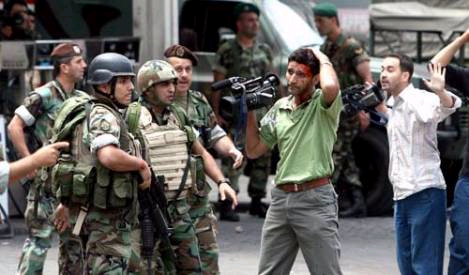 By GHASSAN SOOUD, BEIRUT, May 7, 2008 (MENASSAT)
By GHASSAN SOOUD, BEIRUT, May 7, 2008 (MENASSAT) 


